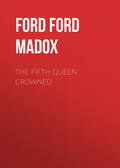
Форд Мэдокс Форд
The Queen Who Flew
"The chimney, I should have said, Mrs. Hexer," the gentleman said.
"But I'm not Mrs. Hexer," the Queen replied.
"No, indeed," the gentleman answered. "The elixir has had a most remarkable success in your case. A photograph of you now would be a most valuable advertisement – before taking and after. I suppose you haven't got one of your former state?"
"But I tell you I'm not Mrs. Hexer," the Queen said.
Whereupon the gentleman became a shade more serious.
"You have exactly five minutes more life," he said, after having consulted one of those keyless watches that never seem to have had enough winding. He laid down his hat and bag, and looked carefully in his book. "Is this not your signature?"
The Queen said, "Good gracious, no; and I'm not going to sign anything more."
"You've signed quite enough in this," the gentleman said.
"But I tell you I never signed it," the Queen replied.
"Oh, nonsense, Mrs. Hexer," the gentleman said. "Come, your time is nearly at hand."
"It's nothing of the sort," the Queen said.
And the gentleman bowed. "You know best, Mrs. Hexer," he said. "There's one more minute."
The Queen waited to see what would happen.
The seconds passed by, and the Queen's heart beat. Then the gentleman tore the page out of his book, at the dotted line, and put the book in the bag.
"By-the-bye," he said, "what's become of the cat?"
The Queen said, "It disappeared with the witch."
The gentleman looked at his watch. "Time's up, Mrs. Hexer," he said, as he put it back in his pocket. "By virtue of this document, signed by your blood – "
"It isn't my blood," the Queen said, when, all of a sudden, the hut vanished away over her head, and she found herself standing in the open air among the sand-dunes, amid a large crowd of people; whilst the two men, shepherd and prince, were lying tumbled on the sand, for the well on which they had been seated had disappeared.
But the most astonishing thing was what happened to the gentleman in black, for he suddenly changed into a black demon and advanced roaring towards her, until something seemed to stop him, and he changed just as suddenly back into the gentleman that he had been before.
"I see there has been some mistake," he said, bowing and placing his hand upon his heart. Then he knelt upon the ground. "Be mine! be mine!" he said. "Oh, most adorable maiden, be mine; marry me, and I will reform; I'll give up smoking; I'll never swear; I'll – I'll go to church – only marry me."
"I can't," the Queen said. "Don't be ridiculous and kneel; I never let the Regents kneel."
"You can marry me – you can," the gentleman said. "I can marry while I'm on earth. Of course, down below it's different. But I'll keep regular hours; I'll be most respectable – I will, if you'll only marry me."
"I tell you I can't," the Queen said; "I don't know what I've done to make you go on in this ridiculous way."
"It's the elixir. You've been drinking it, you know," the demon gentleman said; "and so I can't help it. But if you won't marry me, madam, perhaps we can do a little business in my line. I pride myself that my system is the very best – the seven years' purchase system, you know."
"I don't understand you at all," the Queen said.
"Why, it's very simple. You give me what I want, and I will re-erect for you the desirable family residence that stood here, with all its advantages – the delightfully secluded spot, the landscape, the well of pure water, and the fowl-house with its stock of geese. Come, let me fill you up a form."
"Yes, but what do I have to do for it?" the Queen said.
And he answered, "Oh, a mere trifle – only a formality."
"But what is it?"
"Oh, you only give me your soul – it's nothing at all."
"My soul!" the Queen said. "Certainly not."
"But I'll make you rich," the gentleman said.
"I'm quite rich enough already," the Queen answered.
"I'll make you powerful – make you a great queen."
"I'm one already, thanks," the Queen said.
"I'll give you a broom that you can fly on," the gentleman remarked.
"I can fly without a broom," the Queen said.
"I'll let you drink the elixir," he went on.
"I've had quite enough already," the Queen said.
The demon gnashed his teeth. "Then you won't trade?" he said.
"Certainly not," the Queen answered.
"And you won't marry me?"
"Certainly not!" the Queen said.
There was blue flame, and a great pillar of sand shot up into the air. The wind carried it slowly away – the gentleman in black had disappeared.
"Come, that's something!" the Queen said, with a sigh of relief, when her eye fell suddenly on the crowd of people that were standing looking at her. They were mostly standing on one leg. "Why, whoever are you?" the said.
And a grey-haired man answered, "We are – that is, we were – the geese. I am the oldest of them, and, as such, let me remind you that a ripe man is by far the best one to marry. Oh, maiden, marry me!"
But a perfect storm of voices went up. "No; marry me! I'm – "
But the Queen held up her hand to command silence.
"Don't make such a fearful noise. I can't even hear myself think. I'm not going to marry any of you, though you were very nice, dear geese, and I was very fond of you."
"No; the lady is going to marry me!" a voice said, and the man in shepherd's clothes stept forth.
"No, marry me!" the man in armour said.
"I'm a prince. I will make you a princess," the man in shepherd's clothes said.
"I'm a shepherd," the man dressed like a prince said. "A shepherd is a far better match for a goose-girl than a prince is."
"But why were either of you so deceitful?" the Queen said. "Because it's so ridiculous. You don't look like a shepherd, prince – your skin is much too fair; and you are much too brawny to be a prince, shepherd."
"Well, I thought it was not quite respectable for a prince to be seen visiting a witch, and so I changed clothes with the shepherd here."
"And I changed clothes with the prince because I had seen you from afar, and had loved you; and because I thought a prince would have seemed more splendid than a common shepherd."
"But you were both wrong to try to deceive me," the Queen said. "As for you, prince, I will not marry you to be made a princess, for I am a Queen already; and for you, shepherd, I will not marry you to become a shepherdess, for I am goose-girl already, though my flock has turned back from its goose-shape again. But how did you become geese, anyhow?" she asked of them.
And he who had been the old grey gander answered, "The witch turned us into it when we came to ask for the Elixir of Love."
"Dear me!" the Queen said. "Does love make such geese of people?"
And the shepherd in prince's clothing said, "I'm afraid it does."
"You see, it was as I said," the old grey gander said; "those young men are all fools. You had much better marry me."
He had no sooner said the words than a perfect whirlwind of shouts arose.
"Marry me!" "No, marry me!" "Me!" "Me!" "Me!"
The Queen put her fingers to her ears. "If you don't be quiet I'll fly away altogether," she said.
But it produced no effect at all; the sound of voices went on just like the sound of surf on a pebbly shore.
"Oh, I can't stand it," the Queen said. "And to think that it is to go on like this for ever and ever, and all because of this horrible elixir! I shall fly right away from it."
And she quietly rose and sailed away in the air, and the last she saw of the geese was that they were feebly trying to fly after her, waving their arms frantically as if they had been wings.
The Queen flew straight up into the air, and she had reached a dizzy height before she thought of what she was doing.
To tell the truth, she was a little sorrowful at the thought of leaving the geese; for, with the exception of the old bat, they had been almost her only friends.
"I wish they could have flown with me," she said to herself. "But, good gracious, how high I am getting! I shall be losing my way. Why, the earth looks quite small and quite like a map."
And so it did. Then an idea struck the Queen.
"Suppose I were to fly right up to the sun; what fun it would be!"
And, since the idea had come into her bead, she determined to make the attempt.
Up, up she flew, higher and ever higher, till all the air around was full of strange harmonies, as though ten thousand Æolian harps were being breathed upon in accord by a great wind. And all around her, too, the planets whirred and spun and the stars gleamed, and now and again she would pass through mists of luminousness and of gleaming hail.
Up, up she went till she came where there was a great bow of iridescent colours, and rising from it a great array of white steps, that ran up, up, so high that it took away her breath to look upon them. At the top was a great glare of light.
The Queen felt tired and a little bewildered; it seemed as if her wings would bear her no longer or, at least, no higher.
Upon the many-coloured road she stood and looked up the great white way. A voice spoke to her like a great rushing of wind.
"Maiden," it said, "so far and no further."
And a feeling akin to fear came over her; but not fear, for she knew not what guilt was.
And the voice spoke again. "Go down this bow back to the earth, and do the work that is to be done by you. Be of use to your fellows."
And the Queen turned and went her way down the great road. The air was full of voices, glad voices, such that the Queen had never heard before – full of a joy that made her heart leap to hear.
But she could see no one.
Till at last she came back to the green earth, late in the afternoon.
For a moment, above her, she could see the great span of the rainbow, and then it vanished into the clear air, and the Queen was alone in the little valley. There it was already dusk, though the sky above the long down before her was still golden with the rays of the sun that had sunk behind it.
There was a little rill running along the valley, and the Queen knelt down and drank of its brimfulness, taking the water up in her hand. It was very sweet and cool, and the Queen felt happy to be back on the earth again.
"After all," she said to herself; as she sat herself down in the soft, cool grass, that tickled her hands – "after all, it's something to have firm ground under one; one feels just a little lonely up there, quite away from everything except shooting stars, and the world is a dear old place in the twilight like this."
Up above the hill-top she saw a man's head appear, together with a pair of horses and a plough. Quite plainly she could hear the bridle trappings' rattle and click, and the heavy breathing of the horses in the evening stillness.
It was all so quiet and natural that she did not feel at all surprised.
Just at the brow of the hill, standing out black against the light, the man halted, and, lifting the plough, turned his team of horses round and set off down the new furrow.
With very little hesitation, the Queen went up the hill towards the spot from which he had disappeared, and in a very short time she had reached the brow and stood looking down the furrows. The western sky was still a blaze of glory, and the yellow light gleamed along the ridge of shining earth that the plough turned up, and on the steel of the ploughshare. The ploughman was singing a song, and his voice came mellowly along over the sunlit stubble that was not yet ploughed up.
"I wonder, now, if it will be safe for me to speak to him, or if he'll fall in love with me as soon as he sees me? because it's really too much of a nuisance."
However, she went lightly across the stubble towards him. He was just turning the plough as she approached, and he did not seem to notice her.
"Now, lads," he said to the horses, "the last lap for this evening."
And the horses whinnied softly and set their necks to the collar.
"Can I be of any use to you?" the Queen said.
The man stopped his team for a moment, and looked towards her. Against the glow of the sky she could not make out his face; but he seemed to smile.
"No, friend," he said. "I have all but finished my day's work; but, if you will lead the horses up the furrow, they may go straighter than I can drive them."
So the Queen went to the horses' heads, and took one of them by the bridle, and the great beasts stretched to the work. And the Queen felt a new happiness come over her, at the thought that she was of use in the world.
The sun set as they came to the edge of the field. The plougher stretched his arms abroad, and then came to the horses' heads.
"Thank you, friend," he said to the Queen. He did not look at her, but kept his eyes downcast on the ground with a strangely distant appearance in them. "Will you not come home and sup with us? It is hardly a hundred yards to the farm, and the nearest place to here is several miles onwards."
The Queen said, "Thank you. I should be very glad; but – but – " as the thought struck her, "I shan't be able to pay you, you know."
The ploughman laughed. "Now I see you are a stranger," he said. "But yet I have seldom had strangers pass here that offered to help me."
The Queen said, "Yes, but it is so nice to be of use to any one;" and seeing that he was engaged in unbuckling the horse from the plough on the right side, she did as much for the one on the left.
The ploughman said, "Now, can you ride?"
"Well, I've never tried, but I dare say I could if they didn't go too fast."
"No, I don't think they'll go fast," he said. "Here, let me lift you on. There, catch hold of the horns of the collar."
And in a moment the Queen was seated sideways on the great horse. The ploughman made his way to the horse's head and led it down the valley again. The other horse went quietly along by the side of them.
"How delicious everything looks in the owl-light!" the Queen said.
And the ploughman sighed. "I – I can't see it." he said. "I can't see anything. I'm blind."
The Queen said, "Blind! Why, I should never have known it. You are as skilful as any one else."
The ploughman answered, "Oh yes, I can manage pretty well because I'm used to it, and there are many ways of managing things; but it is an affliction."
The horses went carefully down the hill, and in a little space they had reached the valley whence the Queen had started. It was now quite dark there, and the harvest moon had not yet arisen, but at no great distance from them the Queen could see a light winking.
So the horses plodded along, stopping now and again to crop a mouthful of grass or drink a draught from the tinkling rill, whose sound had grown loud in the twilight silence. In a very short while they had come to where a little farmhouse lay in the bottom of the valley among trees, that looked black in the starlight.
The ploughman called, "Mother, I'm bringing a visitor."
And a little old woman came to the door. "Welcome!" she said, and added, "My dear," when the Queen came into sight in the light that fell through the open door.
The Queen slipped down from the horse and went into the door with the little old woman, whilst the ploughman disappeared with the horses.
"She really is a dear little old woman," the Queen said to herself – "very different from old Mrs. Hexer."
And so indeed she was – quite a little woman in comparison with her stalwart son, with white hair and a rosy face and eyes not at all age-dimmed, but blue as the cornflower or as a summer sky, and looking, like a child's, so gentle that a hard word would make them wince.
She put a chair ready for the Queen by the fireside, and then, on the white wood table, set out forks and knives for her.
"You must be tired," she said kindly; "but we go to bed soon after supper, and so you will have a good rest."
The Queen said, "Yes, I am a little tired; and it is very kind of you to let me stop."
The little old woman looked at her with an odd, amused look in her gentle eyes.
"Now I see you are a stranger," she said
"Yes, I come from a long way off," the Queen said. "At least I suppose it is a great way off, for it has taken me a long time to get here."
At that moment the ploughman came in, with the heavy step of a tired man.
"Mother, mother!" he said gaily; "I'm hungry."
"Son, son," she answered, "I am glad to hear it. There will be plenty."
And so the supper was made ready, and heartily glad the Queen was, for she was as hungry as the ploughman.
And they had the whitest of floury potatoes, in the whitest of white wooden bowls, and the sweetest of new milk, and the clearest of honey overrunning the comb, and junket laid on rushes, and plums, and apples, and apricots. And be certain that the Queen enjoyed it.
And, when it was finished, they drew their chairs round the fire, and the ploughman said, addressing the Queen —
"Now, friend, since you have travelled far, tell us something of what may have befallen you on the way, for we are such stay-at-home folk here, that we know little of the world around. But perhaps you are tired and would rather go to bed."
But the Queen said, "Oh no, I am very well rested now, and I will gladly tell you my story – only first tell me where I am."
"This is the farm of Woodward, from which we take our names, my mother and I, and we are some ten miles from the Narrow Seas."
"But what is the land called, and who rules it?" the Queen said.
The ploughman laughed. "Why, it is called the land of the Happy Folk; and as for who rules it, why, just nobody, because it gets along very well as it is."
The Queen leant back in the great chair they had given her. She rubbed her chin reflectively and looked at the fire.
"The Regent told me that a country couldn't possibly exist without a King or Queen," she said.
"Who is the Regent?" the ploughman said. He too kept his face to the fire that he could not see.
"Oh, well, he's just the Regent of my kingdom. But I forgot you didn't know. I am Eldrida, Queen of the Narrowlands and all the Isles."
The little old woman looked at her interestedly.
And the ploughman said, "After all, you're not so very far from your home; because one can see the coast of it quite plainly on a clear day from our shore, so they say."
"Why, then you must have quite a number of people from there?" the Queen said.
But the ploughman answered, "No, hardly ever any one, because the seas run so swiftly through the straights that no boat can live in them – so people would have to come a long way round by land. Besides, they've got everything that we've got, so what could they want here?" the ploughman said, and added slily, "all except one thing, that is."
"Why, what is that?" the Queen asked.
And the ploughman answered, "Why, the Queen, of course; because we have got her."
But the little old woman held her hand to shield her eyes from the fire's blaze, and looked across at the Queen.
"I shouldn't think it was a very nice country to live in," she said.
The Queen asked, "Why?"
"Well, one evening when we were down by the sea, we saw the whole sky lit up over there, and, later, we heard from a traveller, that the people had set fire to the town when they were fighting about who was to be Regent."
"Yes, I'm afraid they are rather fond of doing that; but I didn't know anything about it."
"How was that?" the ploughman said.
And in reply, the Queen told them her story, to which they listened very attentively, and hardly interrupted at all to ask questions.
And so, it being finished, the little old woman took the Queen up to bed in a little room under the eaves, and, bidding her a kind good night, left her.
The Queen's window looked out down the valley, and she could, as she undressed, see the moon shining placidly along it, gleaming on the dew mist, and glancing here and there on the waters of the little stream where its zigzag course caught the light.
There was never a sound save the tinkle of the brook or the dull noise of a horse that moved its feet in the stable.
So the Queen fell asleep, and did not awaken till the sun was high in the sky.
She rubbed her eyes and could not quite make out where she was at first. She missed the noise of the geese, to which she had been used to awaken. But gradually it all came back to her, and for a while she lay and watched the roses that were peeping in at the window and nodding in the morning breeze.







